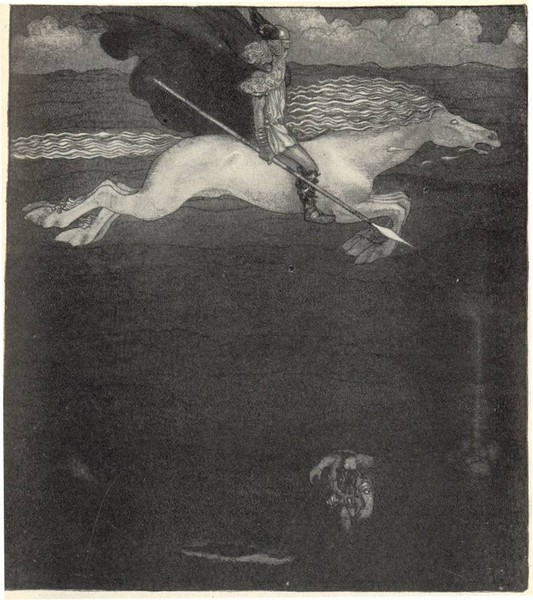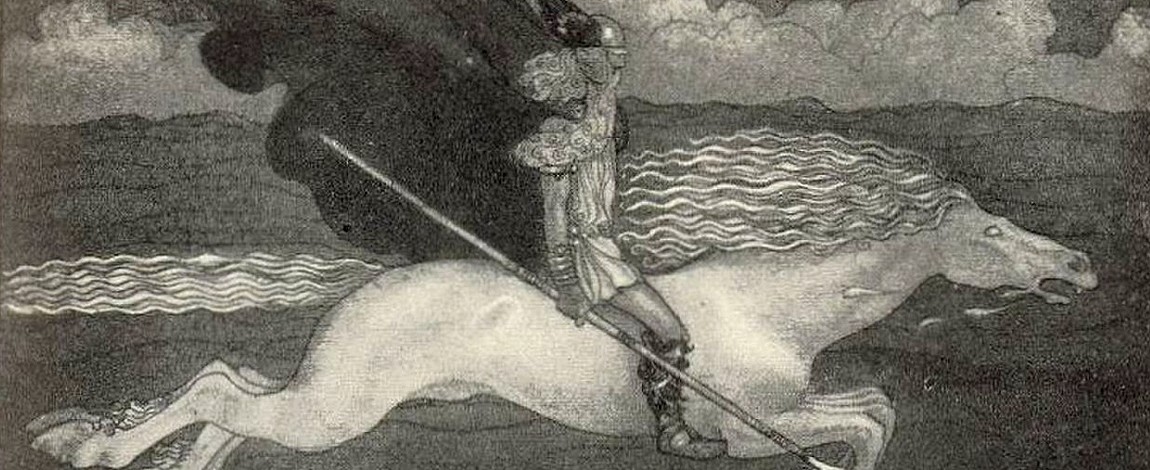
A Norse saga tells that before the kings Inge Bårdsson and Philipp Simonsson signed in 1208, in Kvitsøy, the treated that ended the civil war, the god Odin appeared to a blacksmith. The legend also says that the blacksmith himself told Philipp his encounter, and the king to someone else, and so the story passed from generation to generation.
Aloys Schreiber wrote about this episode in his poem Meister Oluf, published in 1817. A call wakes up Oluf, the blacksmith of Heligoland, in the middle of the night. At the door, there is a knight ready for war, who urges him to shoe his horse because he must be in Norway before the sun rises. Oluf looks at him in a disbelieving manner because his destination is about 500 km from his small island. But the knight insists, and the blacksmith begins his work. And then, he becomes aware that his client is not what he seems: the horseshoe, too small, grows by itself to fit the horse's hoof. The horse is Sleipnir, so fast that it's often depicted with eight legs and even wings, and the knight is the god Odin. When the shoe is ready, Odin bids farewell and goes overland and sea, escorted by twelve eagles who can barely follow him.
Carl Loewe composed with Schreiber's poem the ballad Odins Meeresritt [Odin's sea ride] precisely during a stay in Norway in 1851. We hear a narrator and two characters: Odin and, very briefly, Oluf. The narrator draws our attention at the beginning with his descriptions and keeps it to the last verse; pay attention to the final ride and the flight of the eagles. Odin is as imperious as a mighty god should be; pay attention also to his first call, followed by a short silence, and his impatience when he has to call again. The blacksmith is laconic; once again, pay attention to his two questions, to the four syllables that the piano repeats.
A display of imagination to tell us this legend, which we will hear at the recital of Konstantin Krimmel and Wolfram Rieger in Vilabertran; they will dedicate the second part of their program to Carl Loewe; before the concert, I will be delighted to tell you a little more about this composer and his ballads.
We're listening to Odins Meeresritt performed by Krimmel and Doriana Tchakarova. You'll find at the end of the article a list with some songs programmed in Krimmel's recital and in Johannes Martin Kränzle and Hilko Dumno's recital, two days before. Kränzle will also dedicate a part to Loewe and also perform this ballad. Actually, both recitals are promising!
Meister Oluf, der Schmied auf Helgoland,
Verlässt den Amboss um Mitternacht.
Es heulet der Wind am Meeresstrand,
Da pocht es an seiner Türe mit Macht:
„Heraus, heraus, beschlag’ mir mein Ross,
Ich muss noch weit, und der Tag ist nah!“
Meister Oluf öffnet der Türe Schloss,
Und ein stattlicher Reiter steht vor ihm da.
Schwarz ist sein Panzer, sein Helm und Schild;
An der Hüfte hängt ihm ein breites Schwert.
Sein Rappe schüttelt die Mähne gar wild
Und stampft mit Ungeduld die Erd’!
„Woher so spät? Wohin so schnell?“
„In Norderney kehrt’ ich gestern ein.
Mein Pferd ist rasch, die Nacht is hell,
Vor der Sonne muss ich in Norwegen sein!“
„Hättet Ihr Flügel, so glaubt’ ich’s gern!“
„Mein Rappe, der läuft wohl mit dem Wind.
Doch bleichet schon da und dort ein Stern,
Drum her mit dem Eisen und mach’ geschwind!“
Meister Oluf nimmt das Eisen zur Hand,
Es ist zu klein, da dehnt es sich aus.
Und wie es wächst um des Hufes Rand,
Da ergreifen den Meister Bang’ und Graus.
Der Reiter sitzt auf, es klirrt sein Schwert:
„Nun, Meister Oluf, gute Nacht!
Wohl hast du beschlagen Odin’s Pferd’;
Ich eile hinüber zur blutigen Schlacht.“
Der Rappe schiesst fort über Land und Meer,
Um Odin’s Haupt erglänzet ein Licht.
Zwölf Adler fliegen hinter ihm her;
Sie fliegen schnell, und erreichen ihn nicht.
Master Oluf, the smith of Helgoland,
leaves his anvil in the middle of the night.
The wind is howling at the seashore,
and there is a powerful knocking at his door:
"Come out, come out, shoe my steed,
I have far to go and day is near!"
Master Oluf unlocks the door
and an impressive rider stands before him.
Black is his armor, helmet and shield;
and at his hip hangs a broadsword.
His black steed tosses its mane wildly
and stamps the earth with impatience!
"Where do you go so late? Why so fast?"
"In Norderney I stayed yesterday.
My horse is swift, the night is bright,
and I must be in Norway before the sun!"
"If you had wings, then I'd gladly believe it!"
"My black steed runs like the wind.
But the stars are growing pale,
so come with the shoe and make it quick!"
Master Oluf takes the shoe in his hand,
and it is too small, but it begins to grow.
And as it grows into the hoof,
he is seized by fear and dread.
The rider mounts and his sword clanks:
"Now, Master Oluf, good night!
Well have you shoed Odin's steed;
I hurry now to bloody battle."
The black steed darts forth over land and sea,
and around Odin's head light glows.
Twelve eagles fly behind him,
and they fly swiftly, but do not reach him.
(Translation by Emily Ezust)
Monday 22 August: Johannes Martin Kränzle & Hilko Dumno















Comments powered by CComment